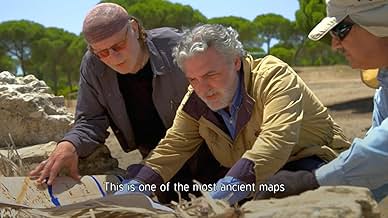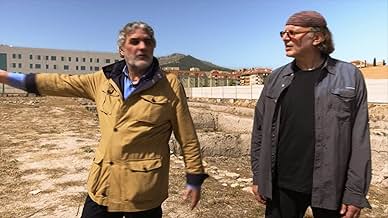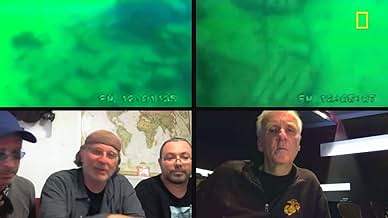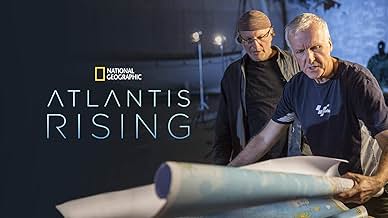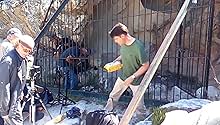Agrega una trama en tu idiomaHollywood legend James Cameron and filmmaker Simcha Jacobovici go on an adventure to find the lost city of Atlantis by using Greek philosopher Plato as a virtual treasure map.Hollywood legend James Cameron and filmmaker Simcha Jacobovici go on an adventure to find the lost city of Atlantis by using Greek philosopher Plato as a virtual treasure map.Hollywood legend James Cameron and filmmaker Simcha Jacobovici go on an adventure to find the lost city of Atlantis by using Greek philosopher Plato as a virtual treasure map.
- Dirección
- Guionistas
- Elenco
- Dirección
- Guionistas
- Todo el elenco y el equipo
- Producción, taquilla y más en IMDbPro
Opiniones destacadas
The movie is nothing but gross conjecture for the entire length of the film. Will have to have eye surgery due to excessive amount of times I had to roll my eyes. Waste of time
Other then bringing on John Cameron for a cameo almost all the information is a repeat or rehash of the most probable theories on the fall of ATLANTIS. The most plausible of them being that the Minoan Island Trading Empire on THERA, now SANTORINI was built upon a dormant Volcano. This erupted with a massive explosion and venting of the caldera which subsequently collapsed. Thus creating a massive Tsunami which inundated the eastern Mediterranean. This occurred sometime during the 16th Centuries B.C.E. The eruption took some time to develop its full fury, so the Island appears to have been evacuated prior to the major eruption. The eruption on the Volcanic Explosivity Index was at the level Six (6), possibly as high as a Seven (7).
There are several other candidates, starting with MALTA, then keep moving West. Even beyond the PILLARS OF HERCULES (Straits Of Gibraltar). To take that theory seriously you would have to believe that ATLANTIS was best represented by George Pal's ATLANTIS; The Lost Continent (1961). A enjoyable fantasy film, but hardly science. If you have seen the other documentaries on ATLANTIS you might want to skip this one. If not watch it. Those who have, watch the movie instead. Its hokey, but fun.
There are several other candidates, starting with MALTA, then keep moving West. Even beyond the PILLARS OF HERCULES (Straits Of Gibraltar). To take that theory seriously you would have to believe that ATLANTIS was best represented by George Pal's ATLANTIS; The Lost Continent (1961). A enjoyable fantasy film, but hardly science. If you have seen the other documentaries on ATLANTIS you might want to skip this one. If not watch it. Those who have, watch the movie instead. Its hokey, but fun.
... and could well start to rise again this year. As this cycle repeats itself regularly and as we are ushering into the "Age of Aquarius". Compare "Aquaman", King Arthur, Antichrist.
Atlantis sunk because of its decadent society and its reveling into black magic. But this coincides with cosmic cycles. Therefore, civilizations seem to develop according to the "Maya factor" (José Arguelles).
After the imminent pole shift (a geophysical event of global magnitude, expected for 2023), mankind will be made believe it has already surpassed Armageddon and that Christ has returned (supported by the arrivals of fake aliens), when in reality it is prone to the ultimate temptation (compare Mark 24).
Atlantis sunk because of its decadent society and its reveling into black magic. But this coincides with cosmic cycles. Therefore, civilizations seem to develop according to the "Maya factor" (José Arguelles).
After the imminent pole shift (a geophysical event of global magnitude, expected for 2023), mankind will be made believe it has already surpassed Armageddon and that Christ has returned (supported by the arrivals of fake aliens), when in reality it is prone to the ultimate temptation (compare Mark 24).
Besides being an excellent inspiration for a fiction guided tour, part of a highly informative fantasy film, there is nothing but speculative conjecture about Atlantis' location. I recognize that the coordination of the route must have been colossal, the same I fully acknowledge and respect the effort and importance of the work of archaeologists. But the way is presented here, everything looks like Atlantean architecture whatever that is, and without a final location is extremely accommodative. There are those who think that Atlantis sunk because of its decadent society. From Plato's Critias, the island was rich in resources, glowing red metal more precious than gold, the ground providing many plants and animals, including elephants. Research identifies the footprints of the megafauna of the south of the Iberian Peninsula 125,000 years ago, with four-meter-high pachyderms and wild boars weighing more than three hundred kilos. I do not recall them mentioning related findings. On a par with the vast majority of documentaries presented lately with an impressive title, multiple findings boxed in the purpose, hundreds of speculations, and no results that advance the reason for the title. At the video teleconferences they are mostly wearing the same clothes, so next time at least make the docuseries seem real.
Another of the James Cameron documentaries that are on Disney Plus as part of the National Geographic strand, "Atlantis Rising" sees Cameron . . . away making Avatar sequels, whilst his collaborator, Simcha Jacobvici does the work and reports in.
Since it's mention in a book by Plato, the "lost continent of Atlantis" has been inspiration for fiction. Here, Simcha Jacobvici begins a quest leaping around the Mediterranean and the Atlantic, tracking down various leads to work out where it might have been. With a degree of speculation, Simcha makes some interesting discoveries and explores some theories. He reports back to James Cameron every so often on his progress and they analyse the ideas.
It's not much of a spoiler, as it might have made the news had he actually done it, but the team don't manage to find definitive proof of Atlantis. They do make some significate discoveries, mostly the discovery of anchor stones in various locations that they perhaps wouldn't have been expected, suggesting the location of islands that operated almost like weigh stations, before ships would move the actual ports. They also find some evidence that that distance travelled by people at various points in history might actually be much further than previously thought.
But, and I say this with the full acknowledgement that I don't have any significant studies of history, particularly cultural history - but some of the film's ideas felt like a stretch to me. Scratches in ancient rocks are taken to be pictures of Atlantis, or an odd shape is a boat. Trying to build links between the various disparate cultures around the Med' feels, to me more like coincidence - or best practice, rather than a proof of refugee's starting a new life.
But, unlike some of the other similar documentaries I've been watching recently, at least with this one I was entertained all the way though. A follow up, with the continued research, would be worthwhile.
Since it's mention in a book by Plato, the "lost continent of Atlantis" has been inspiration for fiction. Here, Simcha Jacobvici begins a quest leaping around the Mediterranean and the Atlantic, tracking down various leads to work out where it might have been. With a degree of speculation, Simcha makes some interesting discoveries and explores some theories. He reports back to James Cameron every so often on his progress and they analyse the ideas.
It's not much of a spoiler, as it might have made the news had he actually done it, but the team don't manage to find definitive proof of Atlantis. They do make some significate discoveries, mostly the discovery of anchor stones in various locations that they perhaps wouldn't have been expected, suggesting the location of islands that operated almost like weigh stations, before ships would move the actual ports. They also find some evidence that that distance travelled by people at various points in history might actually be much further than previously thought.
But, and I say this with the full acknowledgement that I don't have any significant studies of history, particularly cultural history - but some of the film's ideas felt like a stretch to me. Scratches in ancient rocks are taken to be pictures of Atlantis, or an odd shape is a boat. Trying to build links between the various disparate cultures around the Med' feels, to me more like coincidence - or best practice, rather than a proof of refugee's starting a new life.
But, unlike some of the other similar documentaries I've been watching recently, at least with this one I was entertained all the way though. A follow up, with the continued research, would be worthwhile.
Selecciones populares
Inicia sesión para calificar y agrega a la lista de videos para obtener recomendaciones personalizadas
Detalles
- Fecha de lanzamiento
- País de origen
- Sitios oficiales
- Idioma
- También se conoce como
- 探索阿特蘭提斯
- Locaciones de filmación
- Productoras
- Ver más créditos de la compañía en IMDbPro
- Tiempo de ejecución1 hora 33 minutos
- Color
Contribuir a esta página
Sugiere una edición o agrega el contenido que falta

Principales brechas de datos
By what name was Atlantis Rising (2017) officially released in Canada in English?
Responda
